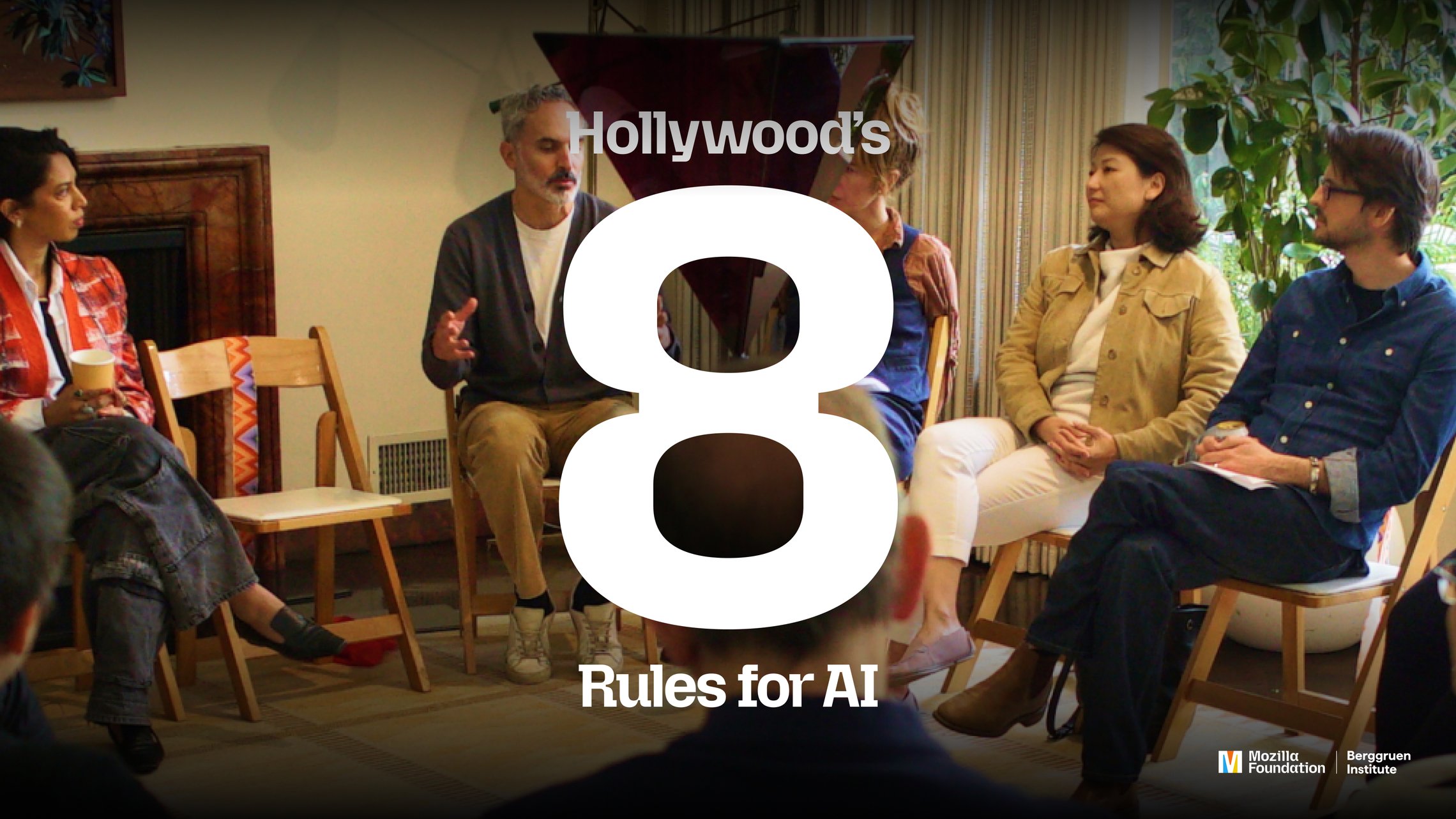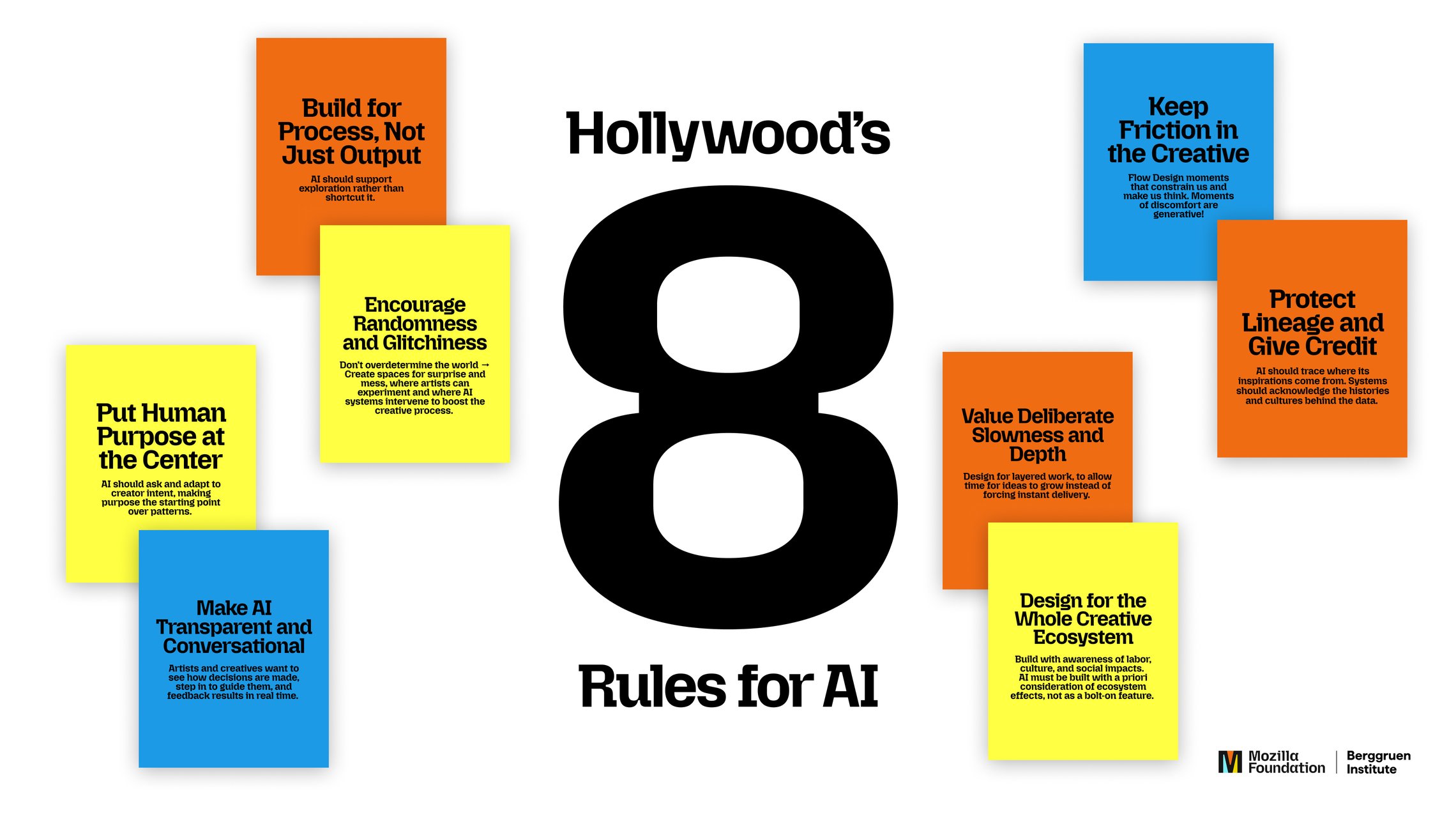Press Release
October 8, 2025

Los Angeles, 8 October 2025 — Mozilla Foundation and the Berggruen Institute today released Imaginative Intelligences: Creativity is Collective-Hollywood’s 8 Rules for AI, a first-of-its-kind report co-authored with 91 creators from film/TV, music, new media, technology, and academia.
The report underscores a simple truth–AI is being built faster than many of us can make sense of, and too often without the input of the people whose livelihoods it threatens. As the industry most likely to be severely impacted by these tools–analysts forecast that music and audiovisual content could see revenue drops of 20% or more by 2028–, Mozilla Foundation and Beggruen turned to these creatives to ask ‘what kind of technology would creativity itself design’?
Held at the Bradbury Building and the historic Hearst Estate, the Imaginative Assemblies used blindfolded deep-listening, tactile modeling, and facilitated dialogue to probe this central question.
“AI will shape culture, but the choice is whether it flattens it or helps it flourish” said Ziyaad Bhorat, Senior Advisor, AI Ecosystem Strategy at Mozilla Foundation. “Creatives told us clearly: the future of art must be built on process, purpose, and human lineage, not just speed and scale. At Mozilla, we believe technology should serve humanity’s imagination, not erode it. Hollywood’s 8 Rules for AI are a blueprint for building systems that honor creative process and purpose.”
Themes that emerged from a survey of Imaginative Intelligences Assemblies participants revealed a community view of redesigning AI around process, purpose, and preservation of human creative ecosystems.
- Adoption is high (97%), but empowerment is low: Many Hollywood workers are experimenting with AI but knowledge gaps are steep with less than half of respondents feeling confident in their technical knowledge of the tools
- Underrepresented Voices: Creatives (63%) feel unrepresented in the debates around and development of AI, exposed to cost-cutting economics, and under pressure to shift into roles that don’t yet have stable value.
- Economic precarity: Artists fear job losses, but beyond the potential economic impact, they are extremely concerned about the erosion of the slow, painful, and deeply human processes that make creativity meaningful.
- Three-quarters of technologists and two-thirds of creatives worry about AI’s impact on economic opportunity.
- Job displacement stood out as the single largest worry, cited by nearly 1 in 4 participants overall.
- Design to preserve process: Creatives insist the question is not whether AI exists in culture, but how it is designed, governed, and valued.
- When asked what AI tools are missing, creatives overwhelmingly pointed to personalization (24%), while technologists emphasized ethical labeling (31%), a split that highlights the different vantage points of those using AI to make culture versus those building it.
“Machines can mimic art, but they can’t embody the pain, joy, and mortality that give human creativity its meaning,” said Gabriel Kahan, Creative Practitioner and Project Co-Lead. “This is not a rejection of AI; it’s a call to redesign it—so it amplifies, rather than undermines, the creative ecosystems that keep culture alive.”
A Call to Redesign
The Imaginative Intelligences report, including Hollywood’s 8 Rules for AI, is a call to action for policymakers, funders, and technologists to ensure AI strengthens, rather than undermines, human imagination and livelihoods. This report challenges policymakers, platform owners and industry to think beyond copyright when making policy around AI— rules for AI should center on human purpose, sustainable ecosystems, and collective benefit. The ask is not to cease using AI entirely, but to rebuild it with creative process preservation.
“Creative expression is among the most essential features of being human. We have been making art and telling stories since the very dawn of our species. AI can be a powerful tool for that expression but we cannot allow it to be a replacement for it. Without thoughtful, deliberate design that puts humans at the center of the creative process, we risk losing the agency to tell our own stories,” said Dawn Nakagawa, President of Berggruen Institute. “The Imaginative Intelligences report outlines how we can design technology that puts the artist at the center and respects process, purpose, and the people behind culture.”

Hollywood's 8 Rules for AI
- Build for Process, Not Just Output AI should support exploration rather than shortcut it.
- Encourage Randomness and Glitchiness Don’t overdetermine the world. Create spaces for surprise and mess, where artists can experiment and where AI systems intervene to boost the creative process.
- Keep Friction in the Creative Flow Design moments that constrain us and make us think. Moments of discomfort are generative!
- Protect Lineage and Give Credit AI should trace where its inspirations come from. Systems should acknowledge the histories and cultures behind the data.
- Put Human Purpose at the Center AI should ask and adapt to creator intent, making purpose the starting point over patterns.
- Make AI Transparent and Conversational Artists and creatives want to see how decisions are made, step in to guide them, and feedback results in real time.
- Value Deliberate Slowness and Depth Design for layered work, to allow time for ideas to grow instead of forcing instant delivery.
- Design for the Whole Creative Ecosystem Build with awareness of labor, culture, and social impacts. AI must be built with a priori consideration of ecosystem effects, not as a bolt-on feature.
The full report, including Hollywood’s 8 Rules for AI is available here.
Notes to editor
Press kit available here
About the Imaginative Intelligences Assemblies
Across five half-day sessions (12–20 people each), participants from across the creative industries - Filmmakers, producers, animators, performers, musicians, composers, technologists, academics, content creators, and storytellers - engaged in facilitated dialogue and hands-on modeling. The process generated nearly 30 hours of audio (18GB), 4,500+ photos (16GB), and 60+ hours of film (6.7TB), with each session fully transcribed and filmed.
About Mozilla Foundation
Mozilla Foundation is a global nonprofit dedicated to ensuring the internet remains open, inclusive, and equitable. Founded in 2003, it supports people-first technology through funding, advocacy, education, and research.Rooted in the open-source movement and guided by the Mozilla Manifesto, Mozilla Foundation focuses on critical issue areas like ethical data practices, healthy digital ecosystems and shifting digital power toward individuals and communities. Its work connects technologists, researchers, policymakers, and activists to reimagine and rebuild systems to serve the public good. With over two decades of global impact, Mozilla Foundation continues to lead the movement for a better technology future—powered by people, and open by design.
About Berggruen Institute
Since its founding, the Berggruen Institute has forged new conceptual frameworks to meet the challenges and harness the opportunities of the arriving future. As an independent think and action tank, the Institute has the autonomy to step outside the usual lanes, reaching beyond academic disciplines to bridge social divides, partisan dispositions, and cultural boundaries. This cross-fertilization, joined with a unique capacity to connect and convene a diverse global network of relationships, gives them the ability to spread actionable ideas and influence events.
Media contact: [email protected]